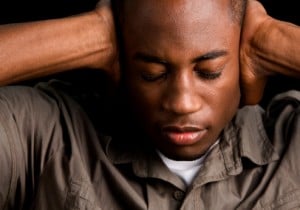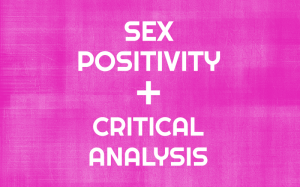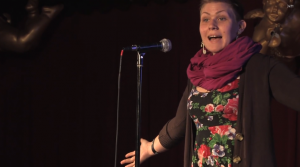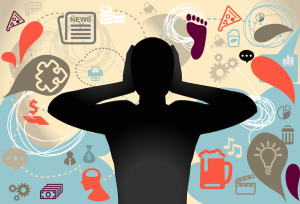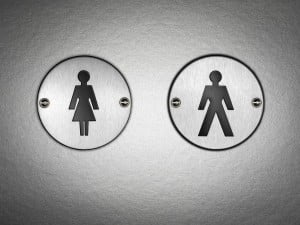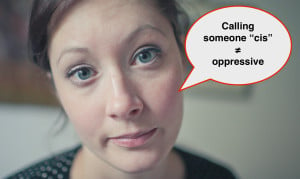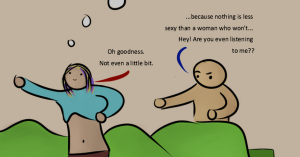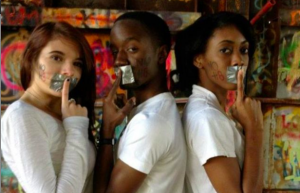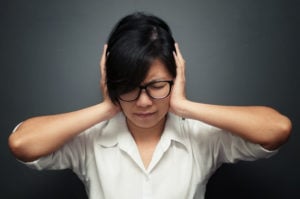
A person with a stressed expression covers their ears with their hands.
“You’re not a victim. You’re a survivor.”
This is a common refrain in activist and feminist communities. Activists often use the term survivor as a blanket term for everyone who’s been sexually assaulted.
Up until recently, I did, too.
But here’s the thing: Not everyone who’s been sexually assaulted identifies as a survivor. Why is this? And how can we ensure those people are included in our activism?
At one point, I identified as a survivor. But after a lot of soul-searching I decided to re-appropriate the term rape victim. For me, that description makes more sense than survivor, because victim reflects a lot of my personal circumstances and ideologies.
Now, I’m definitely not saying that people shouldn’t identify as survivors. That’s their personal choice, and I support their right to choose their own vocabulary in their healing.
But just as we support someone’s right to identify as a survivor, we need to hold space for those who don’t. We need to avoid imposing the description on people who don’t identify as survivors.
Here’s why I prefer to call myself as a victim.
1. Technically Speaking, I Was a Victim
If you look up the word victim in any dictionary, you’ll see that a victim is someone who had a crime or wrongdoing committed against them.
That’s what I was.
In a purely legal sense, victim is an appropriate term.
Of course, dictionary definitions aren’t everything. The words we choose to use aren’t simply defined by dictionaries. They also have connotations which affect the way we feel when we use, read or hear them.
And indeed, the term victim has a lot of negative connotations. But why? This leads me to my next point…
2. I Shouldn’t Feel Ashamed of Being Victimized
The way society treats the term victim, you’d swear that victims were perpetrators.
Think about the negative connotations we associate with the phrases “playing the victim” or “victim of circumstance.”
In victim-blaming rhetoric of all sorts – blaming those who’ve been assaulted, blaming the poor, or blaming people with disabilities – we praise those who ‘rise above victimhood’ and succeed despite being oppressed or abused.
On a purely linguistic level, our vilification of victimhood is a form of victim-blaming in itself.
Why does society vilify victimhood? Possibly because vilifying victimhood makes it easier to deny a crime occurred.
When we shame poor people, it’s because we want to deny that classism and systemic racism exists. When we shame disabled people for being limited by their disabilities, it’s because we want to deny that ableism exists.
And when we shame people who’ve been assaulted for claiming victimhood, it’s often because we want to deny that rape culture exists.
But this is bullshit. Being the victim of a crime might make you feel disempowered, but victims themselves did nothing wrong. By definition, victims were on the receiving end of an unfair and unethical deed.
I chose to re-appropriate the term victim because I don’t want people to forget that a crime occurred, and because I refuse to feel ashamed for the actions of my perpetrators.
Initially, I subconsciously blamed myself for my rape. Now, I’m challenging my own internalized victim-blaming by proudly reclaiming my victimhood.
It’s taken a long time to get to this point, but I can finally say that I refuse to feel bad about the wrong that was done to me.
3. My Life Wasn’t Threatened
I didn’t die during my rape. So yeah, I “survived” it.
But this is no accomplishment. Being penetrated without my consent was heartbreaking, painful and traumatic – but it didn’t directly endanger my life.
I survived being raped. So what? Why would I center my identity around living when nobody actually tried to kill me?
I’m alive, yeah, but only by default. And while some people feel like they overcame a great deal by surviving their assaults, I struggle to share those feelings.
Sometimes, I think we overuse the word “survivor” because we think all forms of rape are physically violent – that they involve physical force and possibly the perpetrator threatening to kill the victim or survivor. In these circumstances, “survivor” might seem appropriate.
But the truth is that this representation of rape is limited.
A part of the reason why I don’t use the word survivor is because I try to challenge this stereotype. I try to speak about non-traditional rape narratives to broaden our understanding of rape.
4. Survival Is a Process
My assaults have threatened my life only indirectly. PTSD, depression, and anxiety – caused mostly by my sexual assaults and being re-traumatized by our insensitive society – is more of a direct threat to my life.
At no point during my assaults did I think I was going to die. But my mental illnesses have, indeed, made me want to die.
The term survivor kind of insinuates that the most life-threatening stage is over, and it’s not. Surviving my actual rapes wasn’t difficult. But surviving with mental illness is incredibly hard.
You wouldn’t say that someone “survived” a boating accident if they’re still in the water, holding onto a piece of driftwood, desperately trying to tread water.
Similarly, I have days where my head is barely above water. I’m trying to make it to the shore, but sometimes I feel like giving up.
In that sense, I’m still struggling to survive. My survival is a process, and I have a long way to go before I feel like I’ve overcome the effects of my rape.
5. I’m Not Here to Inspire You
I’ve written before about how rape victims and survivors are often expected to tell their stories – and how their stories are often appropriated to become a form of “inspiration porn“ to the audience.
Think about the rape narratives that are commonly represented by the media. Often, society wants to hear stories that are hopeful. People want stories that help them believe in themselves, and in the “power of the human spirit.” We don’t want stories that force us to examine how we’re complicit in rape culture.
By highlighting certain rape narratives and erasing others, we are objectifying people who’ve been sexually assaulted. Instead of supporting them and challenging rape culture, we’re appropriating their stories to make ourselves feel good.
In healing from sexual assault, nothing has been as empowering as reclaiming my own story.
To reclaim my own story, I have to be introspective about the vocabulary I use to describe my own pain. When I think deeply about the word ‘survivor’, I have to ask myself: does it bring me comfort? Or is it meant to comfort the audience?
Of course, there are those who describe themselves as ‘survivors’ because it does comfort them. And that’s great. But it doesn’t give me comfort.
After a long period of referring to myself as a survivor, I realized that I wasn’t using the term to empower myself. Rather, I was using it because I thought other people wanted me to.
Sorry, but fuck that. I’ll use the vocabulary I want. I’ll tell my story for my own benefit. If it benefits others, that’s great – but I’m prioritizing my own healing first.
***
Sometimes, people identify as survivors. Sometimes, people identify as victims. Sometimes, people identify as neither. Sometimes, people identify as both.
No matter how people identify, it’s important to honor their choice.
After all, sexual assault is a violation of someone’s autonomy. In their healing, the least we can do is respect their autonomy by honoring the way they identify.
[do_widget id=’text-101′]
Sian Ferguson is a Contributing Writer at Everyday Feminism and a queer, polyamorous, South African feminist who is currently studying towards a Bachelor of Arts majoring in English and Anthropology. Originally from Cape Town, she now studies at Rhodes University in Grahamstown, where she works as vice-chair of the Gender Action Project. She has been featured as a guest writer on websites such as Women24 and Foxy Box, while also writing for her personal blog. Follow her on Twitter @sianfergs. Read her articles here.
Search our 3000+ articles!
Read our articles about:
Our online racial justice training
Used by hundreds of universities, non-profits, and businesses.
Click to learn more





